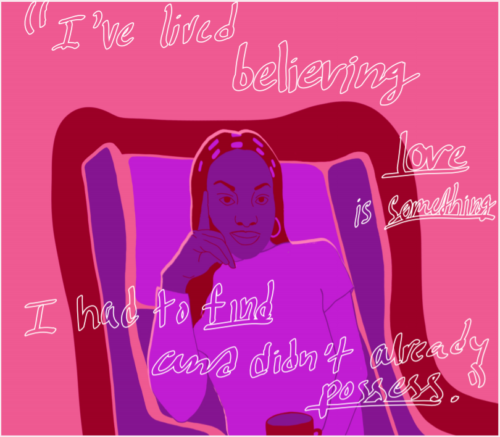It’s hard to exist in this semi-digital reality without hearing of “strategies to avoid Zoom fatigue” and “the importance of daily walks.” The self-care suggestions come from our family and the news, and they are all over the internet—even TikTok recommends you take a break and get some fresh air when you’ve been scrolling for too long. These suggestions make sense considering the CDC reports “markedly elevated” mental health issues across the US: the stress and isolation of a new virus is getting to us all, and people are taking defensive measures.
Until last year, it was easy to rely on others for support, and love could be given and received in more visible ways. Before COVID-19, I would turn to my friends or potential romantic partners for validation and reassurance, but from my bedroom with strict rules to avoid others, this option seemed less reliable. It took a global pandemic forcing us all to be apart for me to realise that I had to take responsibility for caring for myself. Maybe Ari Lennox was right when she sang, “Self-love is the best love…”
But what does self-love even look like? Is it as simple as saying daily words of affirmation, or treating yourself to a lazy day after a tough week? Can these small acts really fulfill us? Maybe it’s growing up in a Christian, Nigerian household, where marriage is placed on a pedestal, or maybe it was all the cheesy rom-coms I watched as a child, but I can’t recall a time when the love I gave myself ever felt like it was enough. I’ve lived believing love is something I had to find and didn’t already possess.
For decades, society has been subliminally signalling that we are inherently inadequate. Social media tells us we aren’t attractive enough, school systems tell us we aren’t smart enough, and we tell ourselves we aren’t worth loving because we are not yet everything we want to be—or at least everything we think we should be. After years of absorbing messages of self-insufficiency, I appear to have lost sight of the fact that I am actually worthy of my own love and respect without changing how I look, what I know, or who I am.
But now, during this time of loneliness, we have remembered self-love. My friends and I have been embracing our emotions and letting ourselves feel all the feelings through group cry sessions (over Zoom) where we ask both each other and ourselves personal reflective questions. It’s a work in progress, but if nothing else, there is now more discussion around self-care and wellness than there was before the pandemic. We have all had to find ways to enjoy being in our own presence, for there’s less pressure to adapt to external forces when the only person around is yourself.
Even the institutions that have always rapidly pushed us forward are now telling us to slow down to take a moment for ourselves. This spring, Harvard College introduced five Wellness Days, spread evenly throughout the term, as an alternative to spring break. As the President of Harvard College, Larry Bacow, wrote in an email to all undergraduates, these wellness days should be “as restorative as possible,” with the goal of “contributing to campus-wide well-being.” Realistically, these Wellness Days are a sub-par solution to the problems arising from the lack of spring break—I wonder how successfully a single day amongst weeks of stress is for unwinding, and if with so little time they can truly provide relief for students dealing with the increased pressures triggered by online schooling. Still, what if these circuit-breakers are exactly the reminder we need right now to press pause? There’s not much you can do in an isolated 24-hours, so why not utilise these random days off to rediscover self-love?
Whether through participating in laugh therapy yoga offered by HUHS’s Center for Wellness and Health Promotion, or laying in bed a little longer, sipping on peppermint tea, and reading a book (strictly for fun, if that is at all possible anymore), we need to do things just because we love ourselves. I’m reading All About Love by Bell Hooks in an attempt to radically rethink what love means to me. Though I haven’t exactly got it all figured out—sometimes I find myself completely overwhelmed, wallowing in a pit of loneliness—I am now able to identify these moments when I need a little love, and look for small ways to provide it all on my own. I think with each Wellness Day I will become better at caring for myself, and over time the reminders to participate in wellness will start to come from within. Maybe that’s what loving yourself is all about.
Achele Agada ’23 (oagada@college.harvard.edu) is focusing on self-love.

